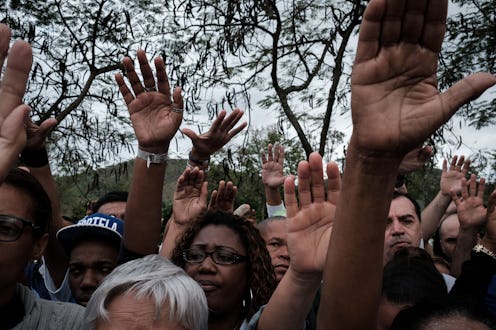News
Alfred Olango Tributes Show Heartbreaking Grief
The nation awoke to news of another black man's death at the hands of police officers on the morning of Sept. 28. The situation prompted angry and mournful messages online to commiserate the loss of the man's life. The 30-year-old was killed in the parking lot of a strip mall in El Cajon, California, after his sister reportedly called police for help with her brother, who may have suffered from either mental illness or a physical disability. The possibility of mental illness and its effect on this shooting has been a primary topic of online conversation, as tributes for Alfred Olango have heavily focused on his reported disability as evidence that black people who need help cannot turn to the police.
Despite widespread social media reports to the contrary, El Cajon Police Chief Jeff Davis told reporters that there was no evidence that Olango was suffering from an epileptic seizure at the time of the shooting. According to the officers, Olango was "acting erratically" before he allegedly pulled an object out of his pocket and pointed it at police officers. Cellphone video from an eyewitness seems to show that Olango took a threatening stance toward the officers, but Davis confirmed to the media that Olango did not have a gun on him at the time of the shooting, nor was any weapon recovered from the scene at all. These tributes have been shared online after Olango's death:
The police statements regarding Olango's mental health at the time of his death didn't discourage discussion of the possibility that Olango suffered from an illness, and that it's part of what brought about his death. The speculation was fueled by the cellphone video, which seems to show a woman claiming to be Olango's sister stating that she had called the police to help her brother. "I just called for help, and you came and killed him," she says in the video. This was understood as a confirmation of disability by online commentators, who nearly universally thought that it represented an even deeper injustice in his death. "How can someone's response to a black person having a seizure is shooting them? You can't justify a senseless murder #AlfredOlango," posted one Twitter user.
The facts of the case are still forthcoming, and will hopefully shed light on the many unanswered questions in these preliminary reports, including definitive confirmation over the matter of a mental or physical disability, the disputed justification of the shooting, and how the officers involved may be reprimanded for their actions, if at all. But one thing is already clear: Those who are engaged in the Black Lives Matter movement and the fight for black equality and safety are absolutely interpreting this shooting as yet more evidence that it's unsafe to be black in America.
